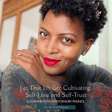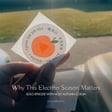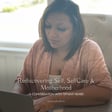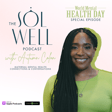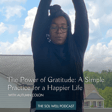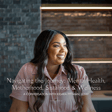Introduction to Soul Well Podcast
00:00:05
Speaker
Welcome to the Soul Well Podcast, where moms of color find strength and community in the mental health space.
Weekly Content Overview
00:00:11
Speaker
Each week, we ignite inspiration as we set our intentions with affirmations and dive deep into honest conversations with fellow moms and mental health experts. We're here to hold space for you, to shatter stigmas and elevate the voices of moms of color.
Focusing on Policy and Community Support
00:00:26
Speaker
We'll fight for policy change, empower you with mindful resources, and most importantly remind you that you're never alone on this journey. It takes a village to raise a
Introducing The Momspace Membership
00:00:36
Speaker
mother. Now let's meet at the well.
00:00:42
Speaker
Are you in need of a supportive community? Then look no further. The Momspace is here. A brand new membership community. Here you'll find connection, encouragement, support, and practical tools to navigate the ups and downs of motherhood. from expert advice, to virtual workshops, to meet and greets and exclusive resources. The Momspace is your go-to destination for support, inspiration, and a whole lot of mama love. So come join us and let's build a thriving community together. Head to sowell dot.co. backslash community and get signed up today.
00:01:21
Speaker
Welcome back to the Sew Well Podcast.
Meet the Hosts: Autumn and Jem
00:01:24
Speaker
It's your host, Autumn Colon, and today's episode, truly, honestly, truly all, this might be my favorite. I am a systems person, okay? So I come from, in my career, an operational background, and I love all things project management and give me a spreadsheet and I am salivating, darling. um So speaking of Gem, we got into systems and navigating motherhood and mental health and what that has been like for her and how she uses systems to navigate motherhood. so
00:02:01
Speaker
this ah This conversation is going to be another great one. So today's guest is named Jem, and Jem specializes in creating intentional, customized systems that empower individuals and businesses to thrive. Her mission is to provide guidance in transforming complexity into a clear and navigable path through the development of tailored systems and structures.
00:02:27
Speaker
She empowers individuals to confront life's intricacies with confidence, enabling you to focus on what truly matters, curating your life without burnout. Listen, y'all, who needs more burnout? Not me. If you do, raise your hands and we got some resources for you, girl, okay? um So before we jump into today's episode, I wanna set us in our intentions.
00:02:51
Speaker
So instead of us starting this episode with an affirmation like we normally do, I'm going to give you three journal prompts from the Momspace Freebie Journaling for Self Preservation, which is available on sowell dot.co.
Jem's Mental Health and Motherhood Journey
00:03:08
Speaker
You can go ahead and subscribe to our newsletter and you will get this freebie delivered right to you with 25 journaling prompts. And today I'm going to just be reading three of those to kind of set us up for what's to come. So whether or not you want to pull out your journal right now and jock these things down for later or you want to download up on our website, you can go ahead and do that. So the first one that I want you to consider is this. Using 10 words, describe yourself.
00:03:47
Speaker
Make a list of everything you need to say yes to.
00:03:55
Speaker
What does unconditional love look like for you? And as a bonus, what would you like? What would you do if you loved yourself unconditionally? And with that, let's jump into today's episode.
00:04:12
Speaker
Hey, mamas, and welcome back to this Oh Well podcast. I'm your host, Autumn Cologne, and today I am here with my guest, Gem. Welcome, welcome, welcome. Hello. Thank you for being here. I'm so excited for our conversation. ah We connected online like through our you know social platforms. like I've been sharing some of the content you've been sharing. And so I'm excited to dive into this conversation about motherhood and mental health and and your journey. um And so before we get started, just talk to me a little bit about who you are and introduce yourself.
00:04:49
Speaker
Yes. Okay. So as you stated, I am Jim. Um, I am everything. I'm a mom, I'm a wife, I'm a person, I'm a friend. Um, and I, I have a very, I'm pretty sure I'm neurodivergent. And so I think this plays into my skillset. Um, but I have a very systems oriented mind professionally. I have done data analytics and product management and, um,
00:05:16
Speaker
I'm at the point in my life now where I'm taking my professional skills, well, my corporate professional skills and utilizing them in my personal to build something impactful for people as, I don't i don't know if it was motherhood or just who I am, but my heart is soft and I want people to have what they need. So that's me. I love that. Okay, great. Well, now I want to know more about what it is. So talk to me a but little bit about that that intersection between your work and what you're doing, what you're building. I know that you're a systems person, so what do you mean by by that when you when you say that?
00:05:55
Speaker
So first, I don't want to say first and foremost, but first and foremost, a lot of times when people hear systems or systems thinking they think of the most complex thing in the world. And while systems can be complex, they don't have to be like systems are literally just frameworks of like, hey, if I do a then the next thing I'm going to do is be like it's just it's your flow, honestly. And so how the world intersected is, um,
00:06:22
Speaker
I had a child about five years ago and wow, what a journey. I wasn't the girl who was like you know dreaming about motherhood and knew everything about babies and all that kind of stuff. So when i when I got pregnant, I learned a lot about pregnancy. And so when I had her, I was like, ooh, I have a baby and myself and my husband. like I was just like, I don't know how to do everything.
00:06:47
Speaker
And my thought process was do everything amazing. And that did not work. It was not sustainable. um I definitely I had postpartum depression, but I definitely think that mindset amplified it because because it wasn't sustainable. Clearly, there were days where I wasn't like I was failing. And instead of giving myself grace, instead of giving myself compassion,
00:07:11
Speaker
It was bad. It was not true. And my mental health really suffered. um But anyhow, so back to my professional path. In product management at my last company, I worked with a lot of different teams. And I'm the product manager. that Number one, I like people. um But I also like to understand, like what what are you doing? What do you need? What do you need to succeed? Because different teams had different priorities, different skills, all that good stuff.
00:07:36
Speaker
And so while I was managing all of these projects, I personally was like, nothing I see from a data standpoint for me is set up in a way that like makes it clear like, oh, Monday, this is what we're doing. Oh, Tuesday, this is what we're doing. And it was so annoying. It was just yeah annoying. So I ended up like I was, you know, communicating with leadership.
00:07:58
Speaker
And they were supportive, but they were just like, this is what we got. So, you know, if you want to make something, go for it. So then I did. um I made it for me. And then in making something that organized my priorities and my thoughts for myself professionally, um obviously at work,
Jem's Personal Systems for Managing Life
00:08:14
Speaker
I'm still a person. I'm still a mother. I'm still a wife. I'm still all of the things.
00:08:17
Speaker
So one day, I don't really know what was going on on this given day for me personally, but one day my brain was full, like she was at capacity. And I was like, I wasn't, I'm a little dramatic, but I wasn't like on the verge of a real mental breakdown, but I was just like, girl, if we don't do something, something's gonna break, something's gonna break. right really So i my friend had introduced me to this app called Notion, and I really liked the flexibility of it, but I wasn't like super comfortable in it yet.
00:08:47
Speaker
And she was like, why don't you just try and do a brain dump? And so I did. And when I first did it, I was like, I hate this because I knew there were 50 things inside of my head. But now I see the 50 things inside of my head and I didn't need to see it. I needed the 50 to move to five. Like that's what I.
00:09:04
Speaker
um So because I do it for my career, I thought, okay, Janelle, so like, what is it that you need? How do you need to segment out this data to make it something more digestible so that you know where you need to focus on for, you know, what is true for you today? um And so that was like the first system I built to organize my mind. And then from there, I was just like,
00:09:25
Speaker
I could do this for a lot of different things. Like there's a lot of areas of my internal world, which is how I used to put it, like my internal world that I can use systems for to make it feel so much more digestible and like less intimidating and overwhelming. And um so I was doing that for a while. And then for myself, and then my friends were like,
00:09:47
Speaker
This could be something more. i am and so That's when i was like I started thinking about it, taking it seriously, and you know started positioning it to other other people. but um My passion point really started with moms because, like I said in the beginning of my journey, I was thinking about my child. like I was thinking about being pregnant and then the baby that came. I wasn't thinking about myself.
00:10:11
Speaker
which I know is very common for a lot of moms, whether they're new moms or veteran moms. And sometimes just having a space, a simple space, yes, it's a system, but it looks simple to you um where you can get the things out of your head for your wellbeing. It makes a world of difference and it just does. So that was like what really sparked my passion for what I do now professionally with Untangled Minds.
00:10:36
Speaker
Yeah. Yeah. Woo. Love that. So much relatability, so much relatability in that story. like and I'm just like, yep, I'm here with you. like i i don't i use notion I use Notion for work. And I'm like, when I first saw like that was like, and you're an expert in it, I'm like, how can I use it for my real life? Because I'm a systems person too because of my undiagnosed neurodivergence.
00:10:58
Speaker
um As well, like I just like I have always operated like my very first career big girl job was in like operations out of school, and the best manager that I had was like very like I hated her at the time. but she was very like, I like, she knew how to work a spreadsheet, like nobody's business. Like she taught me ah how to, how to use like, you know, like tabs and like make these like really massive, like, you know, boards and like project plans and all this stuff. And like, I really took from that my entire career, like how to be this really systemized, organized person, because naturally I'm somebody that has like multiple passions and multiple things that I want to do all the time at the same time. And like,
00:11:42
Speaker
That's not possible. So like, how do I, how do I navigate that? So I was able to do that in my career, same as you, but like, um so when it came to my kids, it was like, how can I bring that into my home? And I'm excited to talk about that when we get to that part of the episode of like, how do you build that system? Um, but I want to go back a little bit in your story, um, to talk about your motherhood journey, um, because you did mention.
00:12:06
Speaker
postpartum and i I, like many other women, having had that experience as well, similar to you. So can you talk a little bit about your experience with postpartum depression and what that was like for you during that time? Oh girl, it was terrible. um So again, I feel like I was just not prepared to
00:12:32
Speaker
so to be a mom in the sense of taking care of my child. I wasn't prepared for the meat element of it, you know? right So I, I got pregnant with my daughter and she was a wonderful surprise. It's actually a very funny story. I was planning to get pregnant two years later. But then I wasn't. and i was pregnant And, um, you know, I was, I was shocked and I was happy and I was like, okay, like let's do this. Like me and my husband were, you know, about it. We were on that team together. Um, and then she came and I knew newborns operate on a cycle. Uh, you know, like a very three hour cycle. I knew there was to be sleep deprivation. Like I knew all of the things, but once I was in it,
00:13:14
Speaker
struggling and at first um I had baby blues I had it really bad I was crying every single day and I thought that was post carbon depression but I have a lot of people in my life thank God who are doctors like one of my best friends right now she's a pediatrician so at the time she was I think she was in residency. I don't remember, irrelevant. But she um you know she helped me understand a lot of like what was going on for me. So I was like, OK, cool, it's baby blues. And then um it I wish I could say like specific things happened to escalate it, but that that that wasn't the case, honestly. like It happened, and I didn't know what was going on. And I think one of my biggest points of frustration, in which incentivized me to like want to you know make my business as I do,
00:14:00
Speaker
was when I went for my six week appointment, I told my doctor, I said, Hey, I don't think something's right. Like, I did the you know, the survey, and I didn't get an outstandingly high score, you know, but I didn't get a low score either. It was on there. um And I was like, some things not right. At the time, I recognized it as anxiety, because it was like clockwork 7pm every night.
00:14:22
Speaker
Oh, I was, I was down bad. I was like, wow I don't know what's going to happen. And she was like, that's normal. You just had a baby. It's a big change. Like, it's just normal. I was like, okay.
00:14:35
Speaker
i Yeah. And then so as you know, for while the baby for the first year has like 75 million appointments, the mom has a six week and then it's just like, Vic, you're done. or i See you later. Yeah, I don't I just I don't know, you know, like I didn't know anything. And I had While I had a lot of like support from my village, um in the sense of like, everybody was checking on me, wanted to talk to me, all that kind of stuff, I also felt really isolated and alone because I didn't have many mom friends at the time, and none of our siblings had kids. And it was hard for me to put into words what my experience was, because in my head, the story in my head was like, I too have never been here before.
00:15:21
Speaker
So you want really clear answers from me of if I'm okay, what do I need? I don't know what I need. I don't know if I'm I'm just trying to make it. um And so it got really, really, really bad, um my depression, around the end of 2019, turning into 2020.
00:15:43
Speaker
Um, by that point I knew I was depressed because once I started going into work crying, once I start like unable to like, you know, even put on the mask, I was like, yeah, something's not right. Um, and then oddly for me, um, I know a global pandemic happened and that was devastating and the world shut down and we didn't know what was going on.
00:16:06
Speaker
part of the world shutting down meant being like a lot of a lot of things being removed. like I didn't have to go outside. I didn't have to talk to people. I wasn't concerned as I usually was. And like having that space for myself um allowed me to like really check in and understand, like oh, not only are you not well, but like you need a second. like these These are the things that you need. and like Prioritize that a bit more because I was home I mean I was home my husband and my child and that was know the different situation as well but it felt like I just had more time for myself to like really check in and connect and You know maybe think about a thing or two. Maybe do something different and so Yeah, that was my
00:16:51
Speaker
That was like pretty much the first year of my daughter being here. um And it's always funny because now when I look back on pictures of that time, um I'm always so surprised because in the pictures, I look so happy.
Addressing Postpartum Misconceptions
00:17:04
Speaker
And I just look like a new mom figuring it out. Like I don't look like what I was feeling. yeah Part of me is grateful because it's like, well, I ah wanted my daughter to see me happy. But another part of me is like,
00:17:17
Speaker
I don't know. I didn't, I didn't love that I put on such a front that and yeah it wasn't like people could see me, but they couldn't see me. And yeah that's cause that's also the only way I knew how to operate with being unwell. Like it's not like no one really teaches you like how do you show up in the world or for yourself when you're sad, when you're dealing with depression and like you don't know where to go. Those are things we supposedly just figure out as we go, but, um,
00:17:44
Speaker
really important lessons really important lessons and the one and the lessons that you you honestly because no one's teaching you you ah unfortunately you have to actually go through it to be able to figure out like you know like okay well i guess this is how i'm supposed to get through it maybe okay Yeah, and when you talk about that, like the whole not having appointments for the mom, you know, like in that first year, it's actually really sad. um And, you know, like a part of why like, I want to have conversations about motherhood and mental health, because like,
00:18:19
Speaker
that people even stop at the postpartum depression and it's like, no, my motherhood is forever. So let's care for mothers at every stage of their mother her yeah journey as opposed to like right the first six weeks, right? Like, you know, there's still work to be done. And so I want to ask you just kind of like, do you have any like common misconceptions about um postpartum depressions that you feel like maybe like you said, you were putting up a mask, right? Like when you were like appearing to your friend um can you Can you talk about any common misconceptions that you ah discovered or know about for p for postpartum?
00:18:57
Speaker
yeah um so my biggest ah misconception was that me feeling this way means I hate my kid. And I was like, well, that's not true. But like, I couldn't, I couldn't, all I knew was that I became a mom and I had this aggressive shift in, in my mental health landscape. And I was just like, Hmm, what's that?
00:19:21
Speaker
um another misconception I feel like because at at a certain point in time I did start talking to people about what was going on uh specifically like other moms and um no shade to anyone who gave me uh feedback or support but I felt like I heard a lot of like well this will pass you'll find your new normal like it won't go back to how it was but you'll find a new normal and first of all Again, I feel like I heard that very late. like I heard that at the five month like postpartum period and I was like, new normal. What are we talking about? like right I need to go back. Right, yeah.
00:20:00
Speaker
um and secondly i didn't know no one really gave context as to what that meant and so i think for me a lot of like where my idea and thought of like oh we need systems is because yes you just you became a mom of a child or two children however many kids you have your normal is going to shift but i feel like at this point now i know my normal absolutely has shifted and my baseline has like it's still pretty much the same. Like, I still I love my child. I love my family. I still deeply need time alone with no one talking to me in order to be my best self. Like, that's never going to change. But I had to find that out three, four years later, because like, I thought I was supposed to be transforming into like, a brand new person. Yeah. Um,
00:20:50
Speaker
And I feel like another misconception, I don't wanna say misconception, but honestly, I think sometimes people just don't really like soak in the messages in the way that they are shared. But you're not, there's nothing wrong with you if you need help.
00:21:08
Speaker
no matter how much help you do need. like I wish that my doctor had spoken to me more about antidepressants and that journey and how it could be more supportive to me because eventually I did get on antidepressants and game changer for me personally.
00:21:24
Speaker
Um, and I remember one of my coworkers at my previous job, she had a baby and she came back to work and I was like, how are you? She's like, I got on Zoloft immediately. I'm fine. You know, struggles. Um, but she was like, immediately. And I was like, love that for you. Because then she could just be like, well, you know, cause motherhood is still hard. It's still effective.
00:21:47
Speaker
And so I don't think that, you know, getting any different any additional support diminishes or changes that. But like, you can go through a hard time and still feel like yourself. And I think that is, I think that's something I want people to understand more of like, like, nothing's gonna be a magic cure all to this transition.
Early Motherhood Challenges and Systems Adoption
00:22:08
Speaker
It's a big transition, you know. um But like, if you need If you need medication, if you need a nanny, if you need to not go, like whatever you need is valid. And that doesn't say anything about you, except maybe that you're honoring your needs when you yeah honor them. um So I wish, I wish that was more commonly understood. And I feel like more people are understanding that now, but yeah.
00:22:35
Speaker
Yeah, yeah, that's so good. that's so And one of the ones that I want to that i that i love that you talked about is is that you know like it's OK to accept help. There's nothing wrong with you. right And it also doesn't mean that you're a bad parent. That's also another misconception. Like, oh, I have postpartum. I'm a bad mom. like I'm a bad parent. It's like, no. You didn't bring this upon yourself. like you know You didn't ask for part of depression. right like And it doesn't make you a bad parent. You're not a failure. like um I guarantee you, if you ask any mom if they were prepared, they will tell you, you can read all the books, you can do all the things and all the articles, but like nothing truly prepares you like just being in it. like there is There is no book that I've read, and if there is one,
00:23:21
Speaker
please share it with me. I would love to give it to everybody at their baby shower. But like you're not a bad parent. And that is a misconception that like moms get in their head very early on. like What is wrong with me? There's something wrong with me that I need to fix it on that. And it's like, no. like It's OK. And like asking for help is fine. You're not a bad parent. it's like you're You're getting help so that that shows that you're actually a good parent because you care about your own well-being and the well-being of your kids.
00:23:51
Speaker
Yes, yes, thank you for sharing that yes exactly exactly that yeah Exactly that. and yeah yeah ah So I want to kind of pivot into the role of systems in in your postpartum since that's what we were talking about and kind of what led you into this, right? Like how did you manage and discover like the power of your systems in your recovery, right? Like what was there like a yeah a moment in your journey where you were like, okay, I need to fix this right now.
00:24:26
Speaker
Yeah, um, so, so number one, I think I had a diagnosed postpartum depression from the beginning. I was just trying to navigate it honestly on my own without the support of any kind of medication. um And so now we're at the two year postpartum mark. So my daughter's two and I had a friend um and anytime we would get into like a disagreement, you couldn't tell me my world wasn't falling apart. You could not tell me that the end of the world was not coming.
00:24:57
Speaker
And so and ah one at a certain point, I was like, this is not normal. like Yes, this is a great friend, very valuable. I don't like disagreeing with her. But I have never in my life like felt this like this response doesn't match what's going on. And I think i think there's something where we need some help.
00:25:17
Speaker
um I would love to say I started my system with that moment, particularly right there. But I think that was just the first clue to me that I might need some additional help. When I started my system, like I said, it was the brain dump. Like that was the first thing that helped me realize like,
00:25:33
Speaker
Oh, you know, you can build something for yourself that will like make your life easier. Because once I did that, I promise you, I felt, I felt 10 pounds lighter, I felt more prepared to handle my life. And then I was like on a systems role. Like I made a system for we had just got to help. So I was like, how are we going to decorate the rooms? Where am I putting all the links for the things I like? Let me make a system.
00:25:58
Speaker
um so i did that i had a system for tracking my joy which um i i called it glimmers which i later learned was a thing for nora divergence so i was like oh this is pretty cool um so that's one of the products that i have out right now where it's like because life be hard okay i It'd be hard sometimes. And a lot of times we have joyful moments and we overlook them. And I personally was like, I was doing that and I felt like I want to soak in the joy of my life and it's hard for me to soak in what I'm not like consciously observing.
00:26:31
Speaker
And so for me, when I track something, I have to slow down for a second to track it. Like that's just what it is. Um, so when I first started my glimmers, um, it was, it was, it was a little, you know, what's the date? What happened? How did I feel? And then I kept doing that for a while and then trying to see like, okay, well where do I have the most glimmers? I eventually evolved it. Cause like, that's the other thing about systems that I would love for people to understand.
00:26:57
Speaker
Where you start is not where you have to finish. As you grow, your system should grow. So when I started Glimmers, it was something really simple and basic because this was the need that I had. As I started using it more, I was like, I would love to be able to see this data point or have this insight from this to help me prioritize certain things more. And so then I made it. I know that sounds very simple. um I am a systems girl, so it was,
00:27:26
Speaker
It wasn't difficult for me, but I think that's also, listen, I support people, you know, getting templates, getting things done for you. Like you don't have to build everything on your own, especially if it's not your skillset. That just feels very overwhelming. But when I became curious, I guess the the moment where I was like, okay, we need systems was when I became curious about like, well, what's happening up here? Like what's happening in my head and in my heart?
00:27:54
Speaker
And why does everything feel so messy? And we're away in what when things feel messy, I'm like, all right, everybody, let's not necessarily shut it down, but like let's stop. Let's take a second. Let's compartmentalize. us or like let's Let's build a system. That's not what I say, but that's essentially what I do.
Family Systems and Personal Growth
00:28:11
Speaker
And so I guess I started to treat myself and my life and my well-being as I would a project at work.
00:28:19
Speaker
and um Yeah. I have no regrets about that. It just g clicked. It just clicked. And you know, like in your systems person. And so for you, it's like, it comes so easily, but like practically like you can apply a system to just like pretty much anything. I remember like Christmas is like my favorite holiday and I'm serious about it. like But for me, like my kids, I would let them like get all the Christmas books and like circle all the things that they want. And they would want things from like Amazon and some things from like Target.
00:28:50
Speaker
And then like Walmart and like all these different stores. So I made a spreadsheet. I was like, okay, so here's what we're going to do. We're going to add all the links. Then I'm going to do like a little filtering system of like where are the stores? Like right remember when they had the Disney store? Remember when they had the Disney store? And so like, I literally would like, that's how I would do Christmas. And I would send.
00:29:08
Speaker
the spreadsheet to ah grandparents and godparents and i'd be like this is what the kids want and then i'd check it off like when it was purchased like so that way because i had a you know little blip where i brought the gift twice because i wasn't sure that you know so i was like no like you we need a system so it doesn't have to be crazy, long, you like with but you know, like all the tools and the bells and whistles, it could be a checklist, right? And like you said, it can evolve over time. Can you talk about like some specific systems maybe that you use in your day to day that another mom could potentially use or see value in? Yeah. Um,
00:29:51
Speaker
Yeah, I can think of if you I'll tell you like my my top three. Um, so is it a head loss connection is back. Okay. um So my number one, my favorite one, i I journal a lot. I used to write down to journal. I have found that doing digital journals is easier for me as I can type faster than I can write. Um, I am not a scrapbooking mama. Um, it's not really my thing.
00:30:19
Speaker
So once I realized like I was journaling and all of this stuff, I started a system for writing letters to my daughter. I write them periodically and I, like everyone asks me, so what's going to happen with these? And I'm like, I'm not really sure. You know, we're figuring out the end goal as we go, but you know, now I have a ah database of letters to her that I think when she turns 18, I'll probably like put together into a cute book.
00:30:44
Speaker
And it'll be ways for her, yeah, it'll be ways for her to know about me, but also ways for her to know about like, like, I have a journal entry from her fifth birthday party and like how I felt but how she was like experiencing it and like how I saw her show up in the world and it has pictures and like all these different things. And I think that's the way people are usually like, Oh, wow, that's That is so beautiful. Oh my God. i let First of all, pause because it's like, I am doing that from now on. that is That is such a genius idea. Like my kids have emails, right? and And I made them all like, I'm going to send them emails, like whatever. But now they use it because they need it. But like, that is such a great idea because it's such an intimate moment. And how could you remember? yeah
00:31:28
Speaker
her fifth birthday and 20 years from now you can't but like right in that moment the day of the day after you can like really be honest and raw with your experiences that's gonna be so beautiful for her and it's so thoughtful i i love that idea like y'all need to be yeah take a notes yeah yeah absolutely absolutely do that because it's also like so I obviously not obviously but I have a mother um and I talked to my mom a lot when I first became a mom and I was like mom how did you first do this with us how did you first do that the my my siblings the first three of us are back to back we're all two years apart so my mom when I would ask her like what what do you remember about this what do you remember about that she's like girl listen
00:32:11
Speaker
I just did it, okay? Like, I i don't remember all of these details that you're asking me. Number one, it was 30 years ago. Number two, I didn't have time to think about what is going to... Like, I had to get the three of you guys into the car. That's what I had to do. So I did it, and I figured it out. And so, because that was her answer so often, I was like, ah well, in the moment, I'm not gonna lie to you. I was a little annoyed because I was like, why would you remember nothing? But then I was like, you had three kids. So, I mean, she had three kids a whole life. I would forget things, too.
00:32:40
Speaker
aye So for me, it was like, okay, well, I want to remember these things. And I know like, I'm not going to, but also like, at some point, my daughter is going to become curious about who she was as a kid. And like, I don't I'm, again, I'm not the scrapbooking mom. So like, I don't want her to not have any memory or knowledge of like,
00:32:59
Speaker
who she was and what was going on around her even like with us like her parents so yeah i just honestly it just happened one day and then i was like oh i like this i'm gonna keep doing it and then i made a template for it and yeah so that's like something i now at first it was random and now it's like um i want to try to do this once a month um because again the premise is for her to know who she is but also Kids see you as their parents for a very long time. I don't know when it clicks that we're human beings, but it takes a while. It does. And my kids are 10 and 13, so i yeah, it takes a while.
00:33:35
Speaker
So for me, it's also like, I want you to know who you were. I also, I'm really big on my daughter knowing like, I am a person too. And it's not always going to be easy for me to like, again, remember where I was when she was five. So like some of it's like, like I wrote a letter recently, like, yeah, I started a business and I'm feeling insecure. I mean, you're extremely happy. you You gave me a hug and gave me flowers, but I'm actually kind of going through it. And like your love is like really like empowering me and like all this stuff, you know? So that's what my favorite is.
00:34:04
Speaker
Um, I have a weekly practice that I do now on Sundays. I open some, I play some like low five music and then I do my brain dump. I dump out everything that's happening in my brain that I want to get done for the week. And I prioritize it according to like priority. So is this high priority, low priority?
00:34:25
Speaker
How hard is this for me to do? Is it like super easy, kind of hard? And then I also segment it into the areas of life it affects because if something's a heavy lift, but it affects my daughter, I'm not gonna lie. I'll do it before I do some other things for myself because yeah my daughter is important to me.
00:34:43
Speaker
Um, and so I made that a long time ago. I recently put in a calendar view. So instead of just seeing things by priority, I see it by priority. And when I, like, when I'm deciding I'm going to do it, that one has been incredibly healthy, um, and incredibly helpful for me because my brain definitely, like after two or three weeks of doing this, my brain just doesn't feel as full on Sundays anymore. It's like, I don't even know, honestly, what we gotta, what we gotta do. Like, I feel like I got it all out last week.
00:35:13
Speaker
yeah And then the the top one, honestly, that has the biggest impact on me, aside from the the letters to my daughter, is the Glimmer's Tracker. So i i how it looks now is that I have a weekly view, I had just have that empty calendar, and then every day I have a home dashboard in my notions.
00:35:32
Speaker
And so I see it and I track any glimmers that I have. And at the end, there's another segment that shows me like a recap. So in August right now, I have 62% of my glimmers are from connection. 54 are from being present. 10 are from being like creative and so on and so forth. For me, that's really, really, really helpful. Um, because August actually was the first month that connection was greater than presence. Um, and I was like, huh, I count connection as connection to myself and connection to others. It's not just one or the other. So for me, that was really empowering information to know. Cause it's like, I need to, and I have known this about myself, but when I get data, when I get data, I'm like, Oh yeah, for real, really got to,
00:36:17
Speaker
So for me it's like slowing down to connect to myself and like making sure when I have space to connect with other these are opportunities that I really want to do and like are organic. So yeah the Glimmer's Tracker and I'm trying to think that one is a game changer. Honestly whenever my anything is happening from a family front so Christmas birthday all of that i I just, because my husband is not the way I am. So he's like, oh, well, you know, he'll start thinking about it when it's like two, three weeks out. And I'm like, this is giving me anxiety. Like, man yeah, yeah, yeah.
00:36:59
Speaker
Um, so I have systems in place for like my family and how we operate and like, what are the things that, you know, are coming up that we need to prioritize? Like events. Yes. But like, do we need to go shopping for X, Y, and Z? Like, do we have to go shopping for fall or things like that? Um, yeah. Yeah. So that one is one that is helpful in terms of like keeping things in line and clean. Um,
00:37:24
Speaker
And oh, last one, this is my last one. I am currently building out a systems for myself space, like we're a habit tracker for slowing down. I am really, I really emphasize like tuning into yourself and understanding where you are. Life moves at a really fast pace sometimes. So honestly, sometimes I can get caught up in that. I can just be like, oh, I gotta do this, I gotta do that, I gotta do this, I gotta do that. And when I say to myself, oh, slow down,
00:37:54
Speaker
It's not helpful. I'm not gonna lie. It's not helpful. I have to think of what are the activities that help me slow down and then do the activities. But again, I don't like for so many things to be inside of my head. So I am building out a habit tracker right now that's just like, hey, these are daily activities that help you slow down. These are weekly activities that help you slow down. These are monthly activities that you can prioritize. Because also,
00:38:23
Speaker
and Again, the lift component of a lot of things in life is something that I need to see because I don't i don't like to prioritize heavy lift. I'm not going to lie to you. Heavy lift is a task to be like, okay, we're going into the day knowing it's a heavy lift month. So that's what I'm currently building out that I'm really excited about because I think it's going to help me when I do feel overwhelmed and it's like, oh, you need to slow down. Because instead of thinking like, well, how do I slow down? It could just be like, go for a walk.
00:38:51
Speaker
Yeah, yeah. Like, you know, simple things.
Incorporating Data in Life Decisions
00:38:55
Speaker
Yeah. Those are some of my favorites. I love this. First of all, love everything you're saying. Like, I'm like, Oh my God. Yes. but Yes. I'm like snapping over here. Like all this is so great. Um, and like I said, like I love systems. We're like, um, my son, my kids were neurodivergent household. So we have checklists and systems for all the things and have, an we actually learned how to do that with my kids like for one of like his very early teachers like we're gonna create a visual chart for him because he when he comes to the classroom like he forgets to like take off his book bag and he forgets to like just the things and so like it has always clicked for him when he has a system in place like and now that he's a teenager he's like mom I need to make sure I have an agenda he they were trying to switch to like digital and And they were trying to switch to digital, and he was like, it's fine on the calendar, but it like it's better for me to write it down. like I need to write it down. And I was like, I will get your agenda, son. like Thank you for advocating for yourself. What works for you? Everybody wants to switch to all digital, but like it like if it doesn't work for you, then it doesn't work for you. and it fine you know You have to find something that works for you. And one of the things I love about what you said in that is like you're gathering the data to learn things about yourself.
00:40:13
Speaker
that like can help you improve over time. right like If you say, yeah oh, um you know like like you know when you grow up, I really love running. And so like that's what I'm going to do for my self-care. But then you actually find out from the data that it makes you more stressed and not able to rest at night. Should you be running? problem you know like You know what I mean? It's like, he' like yeah use the data. Yes. Yes. You're getting it. You're in there. You're in my mind. Yes, I'm getting it.
00:40:41
Speaker
Yes. Because like, so again, this is also what I do professionally. It's like data, data should inform something. Okay. We don't just want just one data for the sake of doing it and having it. And like, same is true for our life and our habits. Like we, we I think I don't know about everybody else, but my goal is to live my best life, to live my happiest life, to live my most peaceful life. So like for me, um, I, mean I need the data to help me figure out like, what, what does that really mean? Cause before I started tracking my glimmers,
00:41:11
Speaker
If you would have asked me what makes me happiest, I would have been like hanging out with my friends or, you know, saying home, I wouldn't have known that like, it doesn't matter if I'm hanging out with my friends, if I'm multitasking, it doesn't matter if I'm at home.
00:41:26
Speaker
and like hang out with my daughter if I'm also like you know doing all these other little things what makes me happiest is when I allow myself the opportunity to be exactly where I am and nowhere else and i'll I'll never forget when I found that out about myself because I was like bet like oh this is it's not necessarily easy to do all the time because like sometimes I have to like prioritize but it's easy in the sense of like, I know how I want to feel in my life. So yeah when my daughter is home from school, I can, I mean, she's, she's bigger now than like when she was two. And so I can like very easily be like, okay, well you want, you do this, I'll do that. Like I can, I can multitask. I could, but I choose not to because number one, I don't like how I feel. Number two, um she's only this age for as long as she is. Like she, we don't have unlimited time.
00:42:19
Speaker
I want to be present being available and like there for my child is a key priority for me. So with that in mind, I make my decisions of how I'm going to be present and what that looks like for us, um, and live, live accordingly. And I feel peace about that. Somebody else might be like, yeah, no, I need to be doing seven different things and do what works for you. But I'm saying for me,
00:42:41
Speaker
Like this is what works for me. um And so yeah, I use a lot of data to help me understand. Another thing actually that I just remembered that I'm about to release later this, I don't know, soon. At some point. Yeah.
00:42:58
Speaker
So um and earlier this year, I realized, like, my therapist I'm in therapy, and my therapist and I have realized, like, oh, you know, you hold on to a lot of stuff. You have not forgiven a lot of people for a lot of different things. And I was like, probably, but how I do that? And she was like, you let it go. I said, listen.
00:43:14
Speaker
You're not saying anything.
00:43:19
Speaker
You're literally not saying anything to me. Like I, I hear you. I understand the concept of what you're saying, but like I'm telling you, I don't know where to start. And because I don't know where to start, I don't do anything. That's who I am as a person. If I don't know yeah how to begin, then I just, I'm, I'm frozen. I'm stuck. So earlier this year, I started this, um, this template called the forgiveness files and it starts out with like a journal entry. Like why?
00:43:44
Speaker
Why are you here? Why are you trying to forgive people? what is what What's the point? What's the reason? Because I think everything you do, a lot of our behaviors are grounded in our mindsets and our values. And so if you, to me, if you don't call that out and recognize that um first and foremost, it's going to be kind of hard to shift anything because you're rooted in something you're not acknowledging.
00:44:07
Speaker
Um, so when I made the forgiveness file, I started with a journal entry and then I have like a cute little database of like, who am I actively working on forgiving? And honestly, the database is just letters. It's letters and letters to these people who have hurt me in situations that I haven't enjoyed. I am included in the database. I have to forgive myself as well. It's not just everybody else.
00:44:29
Speaker
And after doing that, I usually have some key insights of like some false narratives that I've been operating off of. So I have a space for like new narratives. Like, OK, well, what is the newer narrative we want to tell ourselves? I have one that says, life is messy. like It's OK to scribble outside the line. This is art. Live your life like it's art, which is more empowering to me than being like, wow, I made a mistake and I'm such a screw up. you know well Yeah, yeah, yeah.
00:44:56
Speaker
I love these. This is so great. Sorry, keep going. Go ahead, keep going. No, you're good. You're good. This is my thing. like I like to make systems for pieces of life that people usually don't think to systemize because it's like, but it it's not, I don't want to say it's not that hard or it's not that deep, but it is as simple or as complicated as you choose to make it. Usually when we're, like again, changing behaviors, changing habits, like there are things that are ruling that that we need to take a second to sit down and like really adjust.
Guidance on Creating Personalized Systems
00:45:25
Speaker
So even for me, when I another part of the forgiveness files is like, the aftercare, forgiveness is hard work. It's hard work. I remember the first entry I did, I was crying for the rest of the day. I said, Oh, yeah, no, ah we got to fix it for me. I can't do it. Yeah. And then so I realized like, well, I don't I didn't have any space for caring for myself after I did that really big emotional thing. And that's important for me, at least to feel empowered and continuing on this journey.
00:45:55
Speaker
So then I dumped out the things in my head that I know that make me feel good, that are soothing, that are light lifts, and prioritize that. And then the last piece of it is a habit tracker. What are the new habits that you want to move through your life with? like with like As you continue to forgive, do you want to have habits aligned to slowing down? Do you want to have habits aligned to you know being a better person? Do you want to have habits aligned to what do you want to do?
00:46:20
Speaker
Um, and then again, that delivers insights for a month period. So you can see like, okay, Janelle, this month you, um, you meditated 80% of the days. And how do you feel about that? How does that impact your journey with forgiveness, your journey with yourself? And, um, then, you know, wash, rinse and pee. That's the journey. That's the beauty of a system. You, you have a framework and you can continue to use it until like,
00:46:50
Speaker
I don't want to say you get to where you want to go because now we're talking about our inner world, our mental health and stuff. And like, it's always a journey, but yeah, systems are intended to get you to a destination. You don't just budget for the heck of it. Like you budget to have security, you budget to have savings, you budget to have fun. So like, I think the same concepts can be applied to our mental health and the systems that we implement according to that.
00:47:18
Speaker
if we are intentional about it. Yeah, yeah. 100% intentionality, knowing yourself, and also like finding what works for you. like um It sounds like you know a lot of your systems are very like personalized. You've personalized them. You've used them. You're you're testing the data right by doing them. yeah then And then I'm assuming you're offering these templates and these data to yeah other clients or people who need support.
00:47:47
Speaker
Yes, that yes, that's true. And in doing in offering what has worked for me to other people, I also like, these are digital templates, so I have a lot of recordings, I have a lot of how-to's. So say I have a habit tracking of meditating, but for you that doesn't work, you prefer yoga.
00:48:04
Speaker
You can very easily switch it out. like the the The purpose for me in providing these templates is not for you to do what works for me, as my name is Jen, okay? And what works for me? I need to do what works for you and have the support in doing so. um So I create templates, but also like i I do workshops, I do webinars and things like that, teaching people how to, how do you do this?
00:48:30
Speaker
like How do I actually think through how to build a system for myself? Because I'm very systems minded, but just because I'm that way and somebody else might not be, does not mean there is not value in having that support um within yeah your setup. So, yeah you know, i I try to make it versatile enough so that it can be supported to you.
00:48:50
Speaker
And that's mindful, too. It's mindful that like not everybody's going to be where you are, right? like Not everybody's going to have it. Sometimes some people just like really just don't know technology, which brings me to my next question, right? like You and I are talking about this as if we already know what it is, because you we do. But talk a little bit about like how technology can be used as a tool for systems and like what what maybe like some what systems maybe are out there for people to use for building things, like you're describing.
00:49:19
Speaker
Yes. Um, so I'm of the purse to believe that technology was always intended to be more helpful than harmful. Um, and it was always supposed to support us in our, in in society and how it's evolving and things of that nature. So I don't have any thought on how it could be helpful. I think can be used in in the way that you want to use it. So if you want something to be more helpful and productive than like,
00:49:47
Speaker
Let's do it. um In terms of tools to build systems, I think first and foremost, you need to know who you are and be honest and truthful about that. One of my really good friends, she loves Google Suite. She loves Excel and all of that. That's where she has her systems and it is truly what works for her. She does things in a way that I would never think to do honestly. um I think Notion is a really great tool for getting you comfortable with like, okay, so what is it that I need? Because I personally use databases often in Notion. Once I realize this thing is reoccurring, like this, this is not a one time, check it off the list and we're done. I want to do this every month, every week. So like now I need a database because I hate, I hate too much clutter. oh So, so I think Notion is a really great place to start, but, um,
00:50:44
Speaker
Some people prefer Evernote, some people prefer X tiles. It's kind of... about like what's important to you. And again, like I just encourage everyone before you even start thinking about systems or touching a system, building a system, sit down and think about what's important to me and what do I want to see. Those are the top two questions that I think will very much influence where you go from there. And even when you're doing something in Notion, like you we could have the same background database and display that all in seven different ways.
00:51:20
Speaker
So it's important for you to know like what what what helps me make impactful decisions. That's step one. So yeah, those are the tools I would suggest. I'm a Notion girlie, so if you have any questions about Notion, hit me up. but ah Yeah, I have all the questions because I'm like I must not be using notion and the best I don't think I'm using it. I use it honestly like I use it for like my business like for so well this brand like I have a, I have a team and we use it for like project management I use it as a content hub, love it.
00:51:54
Speaker
So it's really great for that. And I'm just like interested on like how to like analyze the data that does come out of it for like insights. And so like, I'm like, I might be booking a workshop or something because I'm like, I love systems. But like, I would love to get better at just kind of like being able to like maybe put them all in one place. Because like I said, like, yeah,
00:52:13
Speaker
I have a system for what we're eating for dinner. like There's a menu because I don't want to be asked any questions from my husband on what is for dinner. If I'm in a meeting and he can just easily just go ahead and do it, like don't text me in the middle of a podcast. just You could just go to the doc and like look at the doc and like figure it out.
00:52:32
Speaker
And I'm always about like ease and how can I make things easier? So I'm like, yes, I'm definitely gonna be love hooking up with you afterwards. And those of you that are listening, I hope you do as well. um Do you use any tools for like tracking your mood or your sleep um or anything? like Are you using, like like my husband wears his watch or I use his phone for like sleep? yeah I don't think it's healthy, but you tell me.
00:52:59
Speaker
Um, so I actually am not using anything for tracking those things. However, as I'm getting curious about myself and like what helps me live my best life, I again, am thinking to build something out in Notion. Um, I'm just really comfortable with Notion and I.
00:53:18
Speaker
I really like being able to set things up in a way that like suits me. like that's That's pretty much where Notion is gonna be superior to me because I'm sure there's apps available for some of the things that I build, but I never see the data the way I want to. and then yeah data Me personally, I don't know about anybody else, but I think if data's not not displayed in a way that is impactful, then like what's the point of this data? like what what what What are we doing with this? How yeah are you using this information now?
00:53:47
Speaker
um I'm not really curious about my sleep patterns. um Not yet. Now I am going to begin building something out for like my moods. Because as I mentioned earlier, I'm on antidepressants, and I have a psychiatrist. And so we are curious about like when I'm experienced low, we want to I want to have data to be able to say like, actually, this is a low based on these factors going on in my life, not that like my brain chemistry is off, you know, like, because when I started the antidepressants,
00:54:17
Speaker
I knew something was off, you know, like I was having weird reactions to normal stuff. Um, current day when I have low, that's what I call depressive episodes. Um, it's usually like situational, which I mean, sometimes life is hard. So, you know, but for me, that's helpful to know because that empowers how I navigate. Um, and yeah.
00:54:40
Speaker
Sounds really complex maybe, but I'm actually just going to start it off with like a little habit tracker.
Technology in Motherhood and Mental Wellness
00:54:45
Speaker
Like today is what day, what emotion are you feeling? Check it off. Yeah. Recap it all at the end of the month and let's get some air. Yeah. Yeah. Yeah. And I do, I do that in in an app. Um, I don't want to, yeah, I do that in an app. Like ah my, my dream is to build my own app. Um, but mine too. So, you know,
00:55:06
Speaker
yeah i mean so Yeah, so everyone stay tuned because um my business I think is a great idea. I love it. I'm excited to build an app. I am you know pulling together the resources to make that happen, but my app will ultimately be like everyone it will be like a mental health dashboard so it'll be a space for you to track yes your joy but also your mood and like what are the things that help you and it'll live in one space where you don't have to build it and there's no building there is just application and use.
00:55:41
Speaker
Um, I don't have a firm timeline on that yet because apps are not something made overnight, but and they're you know, stay tuned. Yeah. Same. Same. Like I have, I currently use this app. I have a condition called PMDD and you have to track in order to be diagnosed.
00:56:00
Speaker
And so that's where I started getting into the habit of tracking. And I i live my life according to my cycle because of that. um So because there are different phases of the cycle where different things are happening with your body and your hormones and all the different things, um that is how I like, I have to track because of that. But it is one of those things that is like very siloed and you have to get something from over here and get something from over here. So, yeah you know, um my my passion is maternal mental health for moms of color. And so the purpose and one of the the goals and the visions for So Well is to build something out for women to be able to have cycle living and know about themselves and insert data and just similar. you know yeah So we're a aligned there. I love that. And I love how we can use now currently in this current day society, technology to support
00:56:50
Speaker
just moms having a better, healthier space and and environment and mental health. Because, like, you know, back then, I'm not sure how they did it. I don't know. Like, I don't know. Like, how did they survive without computers? and You know, they they were just going and they were just trying and praying. That's pretty much it. Like, when I asked my mom, like, how are you doing this? And she was like,
00:57:16
Speaker
I don't know. I just had to. thats in out Yeah. Yeah. And I think a lot of things, um, I don't want to say like necessarily suffered, but I think because like there wasn't as much like data and information and insights and stuff like that, like there wasn't a lot of, a lot of women, a lot of mothers that didn't have like the opportunity to think like, Oh yeah, no, something is off. I haven't been present in like two weeks, three weeks, whatever. Like they just had to go. There was no other way to, to know this stuff.
00:57:44
Speaker
yeah So shout out to them for all of their their hard work and efforts and everything that got this generation to this point.
Connecting with Jem and Community Resources
00:57:51
Speaker
But I'm grateful that we have more tools available to us now. Yeah, exactly. I love that. Thank you so much. This was such a good episode. like I want you to share just like all the ways that moms can connect with you, where they can download templates, book you, whatever it is. like yeah I would love for you to just kind of share that information.
00:58:13
Speaker
yes so you can the easiest way to find me right now is instagram my handle is at underscore untangled mind um from there there's going to be a link in my bio with opportunities to book a call with my templates with um actually those are the main things my website is coming it's coming i'm a solopreneur so it's just me guys i mean um But Instagram is by far the easiest way to to figure out where to touch, where my touch points are. I'm also on threads at the same handle at underscore untangled mind. um And yeah, those are pretty much, those are the main ways to find me. And those would point you to all of the ways in which you can work with me, connect with me. um Even if you just want to like reach out and say, Hey, I have some questions about Notion, how could I use it to be, you know, whatever.
00:59:03
Speaker
Yeah, books and time, we can talk about it. yeah I love to help people. I love it. I love i love it. I love it so much. I love everything that you share just kind of like all about the systems and you know how it's helped you in your motherhood journey. um And you and I toa talked about this offline, but can you talk about how you work and support other moms in and this kind of world of overwhelm and meeting systems in their lives?
00:59:29
Speaker
Yeah, yeah, so I actually have started an accountability group called motherhood in me and it it helps us The purpose of the group is for us all to come together all the moms who have like all of these things going on You know, like motherhood is not just like a one like that's not the only thing you're doing while you're living life you're being a mom you're being a partner you're taking care of yourself you're taking care of your career like Whatever that means and however it looks for you you're managing a lot of different things and so like a lot of times new moms and veteran moms any moms tend to get overwhelmed by all of the balls floating in the air um and so for me like I said I use systems to
01:00:13
Speaker
get out of my head and get more present in my life and so via my accountability group it's going to be I share like some tools and resources that I have used to like get out of my head and be able to be more present for the things that matter in my life and the accountability space of it all is going to be committing to like showing up and doing that work because a lot of times we can find like all of these different reasons like oh no I'm too tired or The kids did this, or I just
Final Words of Encouragement and Community Invitation
01:00:40
Speaker
had a long day. And it's like, yeah, true. it Sometimes it's hard out here. you know like Sometimes it's really, really busy. But if we don't make space to get out of our head and prioritize the things, we're always going to be overwhelmed. We're never going to be present in the pieces of our life that we cannot get back. They always say, like the time the what is it? the days The days are long, but the years are short. Is that the same?
01:01:03
Speaker
Yes, that is. Yeah, true. And like, for me, my thought process is like, well, I want to be there. I want to like really be here and I want to soak it in. um And it's hard when you're just overwhelmed and you want it to be done. So my accountability group is like,
01:01:21
Speaker
No, this is where we are. This is what life has is throwing at us. How can we like get it out of our heads, prioritize it, delegate? Where do we need to ask for support? Where do we need to like you know kick this off for six months later? What do we need in order to be present in our lives and really enjoy these things that matter so much to us?
01:01:42
Speaker
So yeah, that's gonna be motherhood in me. it's um It's starting soon. And yeah, to learn more about it, I have the link in my bio and my Instagram just to have like a, you know, get more understanding. And like, if you're interested, there's a button for you to press to request to be invited into the group. So yeah. Yeah, I love that. I think that it's so wonderful. Like everything you said, like resonates with me just like in my life and i and I'm 100% positive it'll resonate with other moms.
01:02:12
Speaker
who are listening because you're right, like we aren't just one thing, right? Like motherhood is one of the titles that we hold, but it isn't everything that we are. And in order for us to be present, we have to be able to kind of like get everything out, like you said, and kind of put it in a place, right? So then that's why I love systems. That's why you love systems. And so this this group It's going to be helping a lot of people. It's definitely going to be helping me because I'm going to be joining. So and if y'all are interested in joining the motherhood in me.
01:02:45
Speaker
group, I will have links to all the places and all the things that you need to get and learn information about. And so um my last question for you is, you know, what advice do you have for moms right now who are maybe feeling overwhelmed, maybe going through postpartum, maybe just not really sure how to figure all the things swirling in their mind right now. Like they just, they don't get it. Like what advice would you have from the mom to mom for them um just to Just a little bit of hope or inspiration. Yeah. um I would start with, I see you and you're not crazy. This is hard. um And you're not failing. You're not. The advice I would give is take some deep breath and
01:03:33
Speaker
Identify one simple thing, one simple thing you can do for yourself today. I used to just feel so proud and accomplished and like, I love myself when I would drink a cup of tea, a hot cup of tea. oh And, you know, motherhood is hard. Life can be overwhelming. It's also, life and motherhood are also very beautiful and full of lots of joy. It's hard to soak it in when you're overwhelmed. Your feeling and your experience is very valid. Let's take some deep breaths.
01:04:02
Speaker
and figure out how we want to move forward because you deserve to feel good in your life and your motherhood journey as well. Yes. Oh, that's so beautiful. take Take a deep breath. Let's just take a deep breath right now. like Take a deep breath.
01:04:20
Speaker
Thank you so much. like Honestly, I just feel, first of all, we are so related. I'm like, girl, we are like of the same mind. like I just feel like we have so much things in that common, so we need to like connect after this. And i hope yeah yeah I hope that those of you that are listening, that you learned something, I know that you are gonna take something away from this episode. I appreciate you coming, and I just truly enjoyed our conversation. So thank you, thank you, thank you.
01:04:49
Speaker
Thank you for having me. I loved our conversation as well. And like, yeah girl, I mean, I was thinking even before I sat down, I was like, I'm gonna talk to her offline. I just, I feel like there's something here. earlier, but finally, finally, what is, we have a bonus segment where I ask our audience to just share an affirmation, a scripture, or an intention to close out the episode.
01:05:22
Speaker
Okay, so my intention that I'll share might be an intention, might be an affirmation, little combo. um I am connected to myself and all of the blessings that the universe and God has for me. I have everything I need to live the life of my dreams.
01:05:42
Speaker
I am not in lack. I have abundance all around me. Whoo. That was so good. So sweet. So beautiful. I say it to myself daily. Yes. Listen, write that down. Put it on a sticky note. Thank you so much once again and for my listeners. I hope you heal well and I will see you next week on the Sew Well podcast. Bye. Bye everybody.
01:06:06
Speaker
Hit the notification bell wherever you are listening to us today and join us next week as we delve into more mental health conversations. The Sew Well community offers a safe ground for the transformative healing and restoration of intergenerational trauma, ensuring moms of color have a space to rewrite their stories, recover, live well, be seen and heard. Join us online and on Instagram at Sew Well for daily inspiration, blogs, events and more.
01:06:36
Speaker
See you next time!

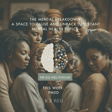
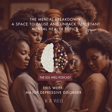

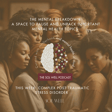
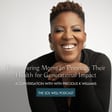
![Life after [baby] loss A conversation with Alishia Anderson image](https://media.zencastr.com/cdn-cgi/image/width=112,quality=85/image-files/61fb5028559b7100aee9f217/492cabf0-4479-488c-b19c-2873fe6bdce8.png)

